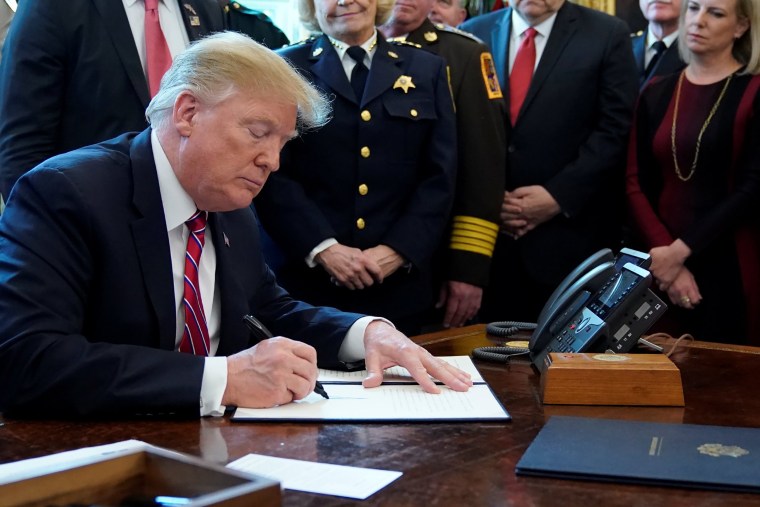It was several weeks ago when Congress added a provision to a massive defense spending bill known as the National Defense Authorization Act (NDAA) that would rename military bases named after Confederate leaders. In a rare display of bipartisanship on a hot-button issue, even the Republican-led Senate Armed Services Committee agreed to the change.
Earlier this month, Donald Trump published a tweet threatening to veto the defense bill. Yesterday, as the Associated Press reported, the White House added a degree of formality to the vow.
The White House said it supported the overall spending figure, but issued a 13-page statement expressing “serious concerns” about multiple provisions in the bill, including the renaming of some military institutions and limitations on the use of funds for Afghanistan that the White House said would constrain the president’s authority. If the bill were presented to President Donald Trump in its current form, “his senior advisors would recommend that he veto it,” the White House said.
The White House added, "President Trump has been clear in his opposition to politically motivated attempts like this to rewrite history and to displace the enduring legacy of the American Revolution with a new left-wing cultural revolution."
What do the names of Confederate leaders have to do with "the enduring legacy of the American Revolution"? Why would the president's team describe a bipartisan idea that enjoys U.S. military support as evidence of "a new left-wing cultural revolution"? I haven't the foggiest idea.
For those who may be new to the story, let's circle back to our earlier coverage and recap how we arrived at this point.
It was last month when U.S. Army leaders opened the door to renaming military bases after Americans instead of Confederates who took up arms against Americans. Soon after, Trump tried to slam that door shut, insisting he would "not even consider" renaming military bases that honor Confederate leaders. The president added that naming the bases after Confederates reflects "a history of Winning, Victory, and Freedom" -- suggesting he may not understand the Civil War as well he as probably should.
Lawmakers in both chambers have largely ignored Trump's posturing. Indeed, late yesterday afternoon, the House passed the NDAA on a 295-to-125 vote. The breakdown did not fall neatly along partisan lines, but a total of 295 "yea" votes is more than enough for a veto-proof majority.
In the Senate, meanwhile, it would take 60 votes in the Senate to remove the provision of the pending NDAA that the president doesn't like. What are the odds that 60 senators will scrap the measure just to satisfy the White House? Roughly zero.
It's why GOP leaders in the upper chamber are reportedly planning to move forward with the existing bill, working from the assumption that Trump is bluffing.
As best as I can tell, Democrats have come to the same conclusion, though party leaders apparently wouldn't mind if Trump kept his promise and vetoed the defense bill. After all, this is a massive piece of legislation that includes, among other things, resources for the military and a pay raise for American troops.
If the president wants to veto this in an election year, all in the hopes of championing the names of those who went to war against the United States, Dems on Capitol Hill will be more than pleased to watch Trump hurt himself. In fact, Senate Minority Leader Chuck Schumer (D-N.Y.) recently went so far as to literally dare the president to follow through on his own posturing.
Would a presidential veto risk hurting the military? Probably not: Trump's veto would probably be overridden, as yesterday's House vote suggested.
What's extraordinary is how Trump left himself in this position for no reason. If he keeps his commitment and vetoes the NDAA in order to champion the names of Confederate generals, the president will look ridiculous. If he retreats, Trump will look weak and feckless, making a very public threat before backing down.
A strategic mastermind he isn't.

